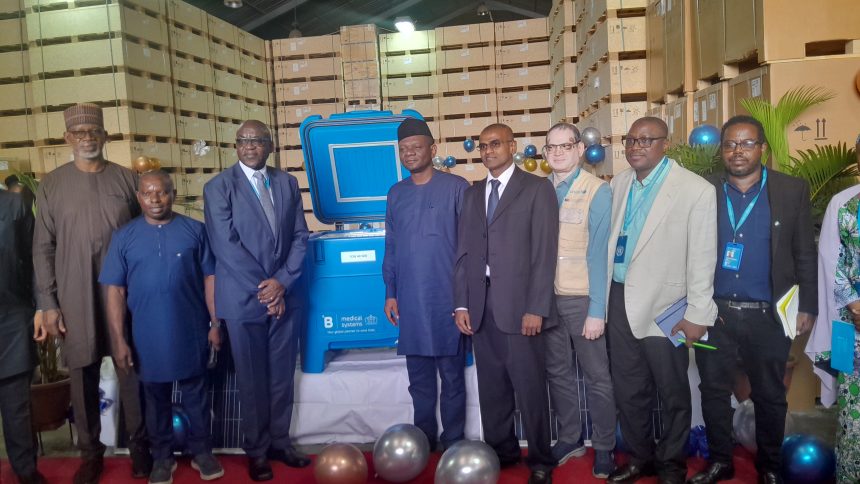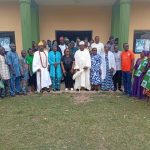The National Primary Health Care Development Agency (NPHCDA) has received 1,653 solar-powered refrigerators from Gavi to enhance the country’s vaccine supply chain.
The Executive Director of NPHCDA, Dr. Muyi Aina, announced at a recent event, pointing out the significance of the donation.
He said, “We recognise and appreciate our partners who have supported us in the supply chain, particularly in vaccine management and supply chain.
“Today marks another manifestation of the health pillar of President Tinubu’s agenda to deliver high-quality primary healthcare services for all Nigerians.”
He disclosed that the refrigerators, valued at millions of naira, will be distributed to states across the country to support the storage and transportation of vaccines.
According to Aina, 1,241 units will be of the brand B medical, while 412 units will be of the brand plus, selected through a rigorous process.
“We have also procured spare parts and 10 years of maintenance agreements, including plant preventive maintenance by the vendor.
“Every single unit comes with temperature monitoring devices to ensure the vaccines are stored at the right temperature.
“The distribution of the refrigerators will be based on the disease burden and gaps in each state. Every state in the country will receive some of the equipment, with 53% going to states in Northern Nigeria and 47% to states in Southern Nigeria,” he said.
Aina also disclosed that NPHCDA is planning an integrated campaign of measles, rubella, polio, and nutrition interventions, targeting 109 million young Nigerians between zero to 14 years.
He, therefore, urged Nigerians to participate and take up the vaccines, stressing the importance of immunisation in primary healthcare.
Aina expressed gratitude to President Tinubu for his vision and leadership, as well as to the Minister of Health and the Coordinating Minister for their support.
He also thanked partners such as Gavi, WHO, UNICEF, and others for their commitment to vaccination in Nigeria.
“This donation is a testament to the power of partnership and collaboration. We look forward to continued partnership and support from our colleagues, partners, and the Nigerian public,” he added.
Speaking earlier, the World Health Organisation (WHO) Country Representative, Dr Alex Gasasira, expressed WHO’s commitment to supporting Nigeria’s efforts to strengthen its primary healthcare system, particularly in the area of immunisation.
Represented by Alex Chimbaru, the Deputy Country Representative, extended sincere appreciation to the government of Nigeria, Gavi, UNICEF, and other partners for their commitment to immunisation.
He said, “The handover ceremony of the Solar Direct Drive Refrigerator to the NPHCDA marks a pivotal role towards enhancing Nigeria’s immunisation infrastructure.
“These solar-powered refrigerators will play a vital role in maintaining vaccine quality and safety, especially in remote and energy-challenged communities.”
The WHO representative noted that the initiative aligns with international strategic priorities, particularly those outlined in the Immunisation Agenda 2030, which advocates for equitable access to vaccines, sustainable cold chain systems, and integration with primary healthcare.
“By leveraging solar technology, we are ensuring not only the potency of vaccines but also advancing environmental sustainability and strengthening health systems’ resilience,” Gasasira added.
UNICEF has reiterated its commitment to supporting Nigeria’s efforts to strengthen its healthcare system, particularly in the area of immunisation.
The UNICEF Chief of Health, Dr. Maharajan Muthu, said the handover ceremony is a testament to the power of partnership and collaboration, adding that the cold chain infrastructure is the backbone of an effective immunisation program, ensuring that vaccines and other temperature-sensitive medical supplies retain their potency from storage to administration.
Muthu disclosed the UNICEF’s role in supporting the NPHCDA in strengthening cold chain systems, providing technical support in analytics, identification of cold chain needs, procurement, and delivery of state-of-the-art equipment.
He said, “The handover includes 1,653 solar direct drive refrigerators, 165 sets of spare parts, temperature monitoring devices, and 30-day temperature recorders, valued at approximately $11 million.
“This investment will significantly enhance Nigeria’s healthcare infrastructure, enabling outreach to remote communities and ensuring that safe and effective vaccines reach every child, leaving no one behind.”
Muthu noted that while the supplies handed over address one set of challenges related to cold chain equipment, efforts are needed to address remaining challenges, such as asset registration and tracking, regular maintenance, vaccine and logistics stock tracking, and sustainable financing solutions.
“UNICEF remains committed to working alongside the federal government of Nigeria to overcome these challenges.
“We will continue to strengthen the immunisation supply chain, support community engagement, and advocate for sustainable financing to ensure every child receives life-saving vaccines,” he said.
Muthu expressed appreciation to Gavi and alliance partners, including WHO, NPHCDA, and the Ministry of Health, for their efforts to increase immunisation coverage in Nigeria.
ALSO READ TOP STORIES FROM NIGERIAN TRIBUNE
WATCH TOP VIDEOS FROM NIGERIAN TRIBUNE TV
- Relationship Hangout: Public vs Private Proposals – Which Truly Wins in Love?
- “No” Is a Complete Sentence: Why You Should Stop Feeling Guilty
- Relationship Hangout: Friendship Talk 2025 – How to Be a Good Friend & Big Questions on Friendship
- Police Overpower Armed Robbers in Ibadan After Fierce Struggle






